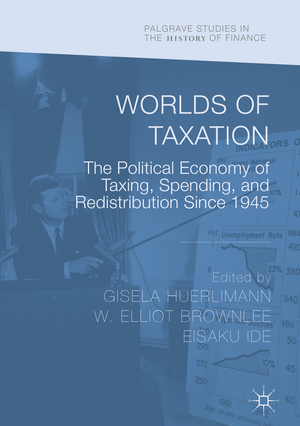Worlds of Taxation: The Political Economy of Taxing, Spending, and Redistribution Since 1945: Palgrave Studies in the History of Finance
Editat de Gisela Huerlimann, W. Elliot Brownlee, Eisaku Ideen Limba Engleză Hardback – 13 aug 2018
| Toate formatele și edițiile | Preț | Express |
|---|---|---|
| Paperback (1) | 1108.99 lei 6-8 săpt. | |
| Springer International Publishing – 21 dec 2018 | 1108.99 lei 6-8 săpt. | |
| Hardback (1) | 1114.21 lei 6-8 săpt. | |
| Springer International Publishing – 13 aug 2018 | 1114.21 lei 6-8 săpt. |
Din seria Palgrave Studies in the History of Finance
-
 Preț: 362.11 lei
Preț: 362.11 lei - 9%
 Preț: 764.94 lei
Preț: 764.94 lei - 9%
 Preț: 626.30 lei
Preț: 626.30 lei - 18%
 Preț: 737.26 lei
Preț: 737.26 lei - 15%
 Preț: 522.89 lei
Preț: 522.89 lei -
 Preț: 451.65 lei
Preț: 451.65 lei - 15%
 Preț: 701.06 lei
Preț: 701.06 lei - 18%
 Preț: 726.37 lei
Preț: 726.37 lei - 15%
 Preț: 712.22 lei
Preț: 712.22 lei - 15%
 Preț: 530.25 lei
Preț: 530.25 lei - 18%
 Preț: 1006.55 lei
Preț: 1006.55 lei - 18%
 Preț: 726.06 lei
Preț: 726.06 lei - 18%
 Preț: 786.84 lei
Preț: 786.84 lei - 18%
 Preț: 792.03 lei
Preț: 792.03 lei - 18%
 Preț: 724.94 lei
Preț: 724.94 lei - 15%
 Preț: 702.54 lei
Preț: 702.54 lei - 18%
 Preț: 723.69 lei
Preț: 723.69 lei -
 Preț: 388.72 lei
Preț: 388.72 lei - 15%
 Preț: 694.19 lei
Preț: 694.19 lei - 18%
 Preț: 782.72 lei
Preț: 782.72 lei - 15%
 Preț: 637.59 lei
Preț: 637.59 lei - 18%
 Preț: 1108.51 lei
Preț: 1108.51 lei - 9%
 Preț: 920.31 lei
Preț: 920.31 lei - 15%
 Preț: 711.89 lei
Preț: 711.89 lei -
 Preț: 383.12 lei
Preț: 383.12 lei - 18%
 Preț: 891.33 lei
Preț: 891.33 lei - 18%
 Preț: 958.25 lei
Preț: 958.25 lei - 18%
 Preț: 1008.28 lei
Preț: 1008.28 lei -
 Preț: 445.88 lei
Preț: 445.88 lei - 18%
 Preț: 1113.58 lei
Preț: 1113.58 lei - 15%
 Preț: 646.75 lei
Preț: 646.75 lei - 15%
 Preț: 702.05 lei
Preț: 702.05 lei -
 Preț: 450.11 lei
Preț: 450.11 lei - 18%
 Preț: 794.39 lei
Preț: 794.39 lei - 18%
 Preț: 948.29 lei
Preț: 948.29 lei - 15%
 Preț: 697.97 lei
Preț: 697.97 lei - 18%
 Preț: 728.74 lei
Preț: 728.74 lei
Preț: 1114.21 lei
Preț vechi: 1358.78 lei
-18% Nou
Puncte Express: 1671
Preț estimativ în valută:
213.19€ • 222.62$ • 176.05£
213.19€ • 222.62$ • 176.05£
Carte tipărită la comandă
Livrare economică 15-29 aprilie
Preluare comenzi: 021 569.72.76
Specificații
ISBN-13: 9783319902623
ISBN-10: 3319902628
Pagini: 448
Ilustrații: XVIII, 357 p. 20 illus.
Dimensiuni: 148 x 210 x 29 mm
Greutate: 0.6 kg
Ediția:1st ed. 2018
Editura: Springer International Publishing
Colecția Palgrave Macmillan
Seria Palgrave Studies in the History of Finance
Locul publicării:Cham, Switzerland
ISBN-10: 3319902628
Pagini: 448
Ilustrații: XVIII, 357 p. 20 illus.
Dimensiuni: 148 x 210 x 29 mm
Greutate: 0.6 kg
Ediția:1st ed. 2018
Editura: Springer International Publishing
Colecția Palgrave Macmillan
Seria Palgrave Studies in the History of Finance
Locul publicării:Cham, Switzerland
Cuprins
The Political Economy of Taxing, Spending, and Redistribution Since 1945: An Introduction.- How Employers and Conservatives Shaped the Modern Tax State.- How They All Came to Love the VAT: Consumption Taxes, Big Business, and the Welfare State in Sweden.- Working-Class Power and the Taxation of Current Earnings: Danish Pay-As-You-Earn in Comparative Perspective.- Universalism and Tax Consent in Denmark.- The Powerlessness of Employees in France: The Spread of Income Taxation, 1945–1980.- Tax Policy in the United States: Was There a “Neo-liberal” Revolution in the 1970s and 1980s?.- Tax Reformers’ Ideas, the Expenditure-Taxation Nexus, and Comprehensive Tax Reform in the United States, 1961–1986.- The Rise and Fall of the Industrious State: Why Did Japan’s Welfare State Differ from European-Style Models?.- A Reverse-Functioning System: Japan’s Social Security System and Tax Progression in the Early Twenty-First Century.- A Fair Case for Tax Relief: Swiss Tax Policy, 1940s to 1960s.- Unfairness, Inequality, and Tax Evasion: An Analysis of the Distribution of the Tax Burden in Greece, 1955–1989.- Limits to Redistribution in Late Democratic Transitions: The Case of Spain.
Notă biografică
Gisela Huerlimann is a Senior Researcher at ETH Zurich, the Swiss Federal Institute of Technology, Switzerland.
W. Elliot Brownlee is an Emeritus Professor of History at the University of California, Santa Barbara.
Eisaku Ide is a Professor of Economics at Keio University in Tokyo, Japan.
W. Elliot Brownlee is an Emeritus Professor of History at the University of California, Santa Barbara.
Eisaku Ide is a Professor of Economics at Keio University in Tokyo, Japan.
Textul de pe ultima copertă
This book provides a historical understanding of current debates over tax reform and offers a comparative framework for discussing the relationship between fiscal policy and the distribution of income and wealth. Topics covered include the evolution of income taxation since World War II; the turn toward value added taxation; the relationship between tax reform and the construction of welfare states; the impact of globalization on tax and fiscal policy; the social forces shaping tax consent; and the political economy of tax and fiscal reform. These topics are covered in case studies that focus on significant episodes in the fiscal history of Denmark, Sweden, France, Greece, the United Kingdom, Spain, Switzerland, the United States, and Japan.
Caracteristici
Discusses the relationship between fiscal policy and distributional issues Features case studies from key OECD nations Contributes to understanding of key public spending debates
